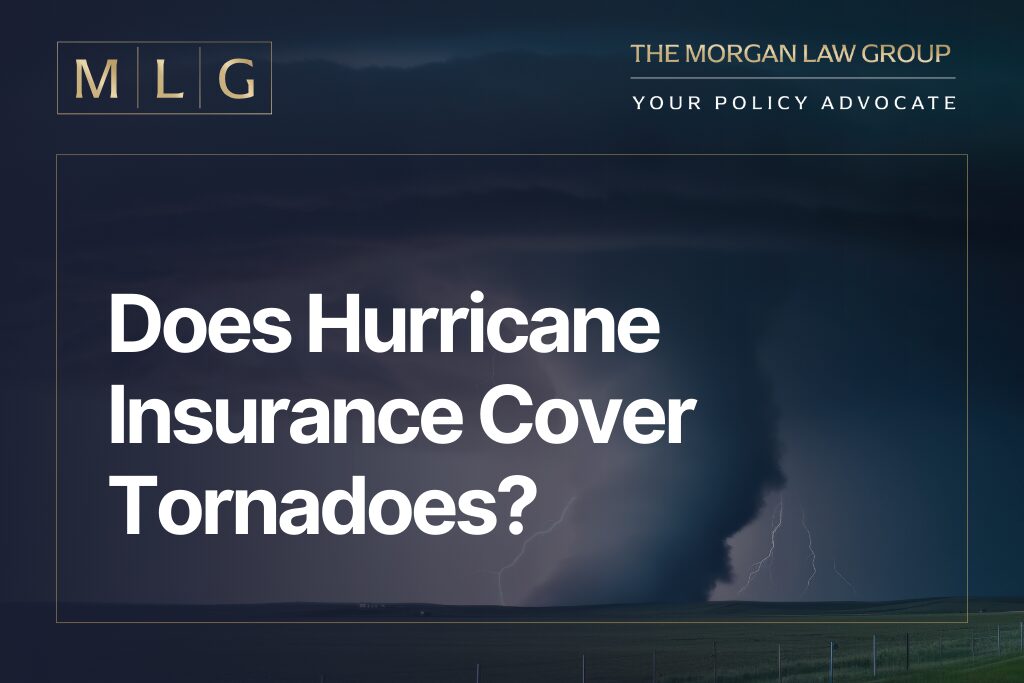When natural events strike, like hurricanes and tornadoes, as policyholders, you often turn to your insurance policies to recover from the loss. But insurance coverage can be complex, and many are left wondering: does hurricane insurance also cover tornado damage?
At The Morgan Law Group, insurance claims attorneys help policyholders navigate this exact kind of challenge. Let’s break down the matter between hurricane insurance and tornado coverage, and what you need to know to protect your property effectively.
Similarities Between Hurricanes and Tornadoes
Hurricanes and tornadoes have certain similarities that often blur the lines in coverage. Both are forms of severe windstorms that can cause extensive damage to homes, vehicles, and other property.
Hurricanes are large-scale tropical cyclones that can stretch for hundreds of miles, bringing both wind and water damage. Tornadoes, on the other hand, are smaller but often more intense wind events that cause concentrated damage over a shorter time and area. Despite these differences, insurance companies may classify both events under the umbrella of windstorm coverage, depending on the policy.
When assessing your insurance needs, it is important to consider how your policy defines these events. Some policies might use terms like “windstorm damage” to describe coverage for both hurricanes and tornadoes, while others may provide separate deductibles and coverage for each type of event. Knowing these definitions is critical to avoid surprises during the claims process.
Understanding Windstorm Insurance Coverage
Windstorm insurance is a type of policy or endorsement that provides protection against damage caused by high winds, including those from hurricanes, tornadoes, and other major wind events. Many standard homeowner policies include some wind damage coverage, but in regions prone to hurricanes and tornadoes, insurers may require a separate windstorm policy or endorsement to fully cover such risks.
Windstorm insurance is essential for residents in areas with a high likelihood of such weather events, as standard policies may not adequately cover the damage. This coverage typically includes repair or replacement costs for homes, garages, sheds, and other structures damaged by strong winds. Importantly, it also may cover costs associated with securing a damaged home, such as boarding up broken windows.
Understanding your windstorm insurance is crucial, as insurers will often have specific exclusions or limitations. For example, some policies may exclude damage from water intrusion unless it is caused directly by wind-related damage, such as a broken window or roof breach. When reviewing your policy, ensure that you understand these exclusions and purchase supplemental coverage if necessary, particularly if you live in a high-risk area.
Do You Need a Separate Windstorm Insurance?
Many homeowners assume that if they have a hurricane deductible, they are fully protected against all forms of wind-related damage. However, this is not always the case.
For instance, a hurricane deductible is unique and specific – it applies only when the damage is caused by a named hurricane as declared by the National Weather Service or National Hurricane Center. Tornadoes that occur independently of a hurricane would not be covered under this deductible.
For this reason, windstorm insurance remains a critical consideration, especially if you live in a tornado-prone area. A hurricane deductible may offer you financial protection when a hurricane strikes, but it will not necessarily apply to other wind-related incidents like tornadoes.
The hurricane deductible is typically calculated as a percentage of the home’s insured value, making it a significant out-of-pocket expense if triggered. In contrast, windstorm coverage for other events, including tornadoes, usually has a more traditional flat deductible.
The cost and terms of windstorm and hurricane insurance vary widely based on location, the home’s construction, and the insurer. Policyholders should ensure they fully understand the scope of their coverage and consider additional endorsements to fill any gaps in their insurance.
How Insurance Claims Involving Hurricanes and Tornadoes Work
If you’ve experienced damage from either a hurricane or a tornado, the claims process can feel overwhelming. Navigating insurance claims requires an understanding of your specific policy, the nature of the damage, and how your insurer defines the storm that caused the damage.
For hurricane damage, insurers often have a distinct claims process. They will verify whether the storm was classified as a hurricane and whether a hurricane deductible applies. This deductible is usually higher than the standard deductible for other perils, often ranging between 1% and 5% of the home’s insured value. If the damage occurred because of a hurricane’s sustained winds, your claim will likely fall under this deductible, making it important to have savings to cover the cost.
In the case of tornado damage, claims typically involve a standard windstorm deductible, which is generally lower and easier to manage financially. One key difference in the claims process is that tornadoes do not require a declaration from national weather services like hurricanes do. This distinction can make the claims process faster, as the event’s classification is usually less contested.
Regardless of the type of storm, working with an experienced insurance claim attorney can help simplify the claims process and ensure you get the compensation you deserve. Insurance companies sometimes delay or deny legitimate claims, especially when interpreting policy language regarding hurricanes versus tornadoes.
Do You Need Legal Assistance About Your Insurance Coverage?
When it comes to protecting your property from hurricanes and tornadoes, understanding your insurance coverage is vital. Both hurricanes and tornadoes can cause devastating wind damage, but the way insurance policies treat these events can vary significantly. Windstorm insurance is often needed in addition to hurricane coverage to ensure you are fully protected.
If you’re dealing with an insurance claim related to a hurricane or tornado, The Morgan Law Group can provide the guidance you need. Call us today at (866) 969-4968 or complete our online form and have your free consultation.

